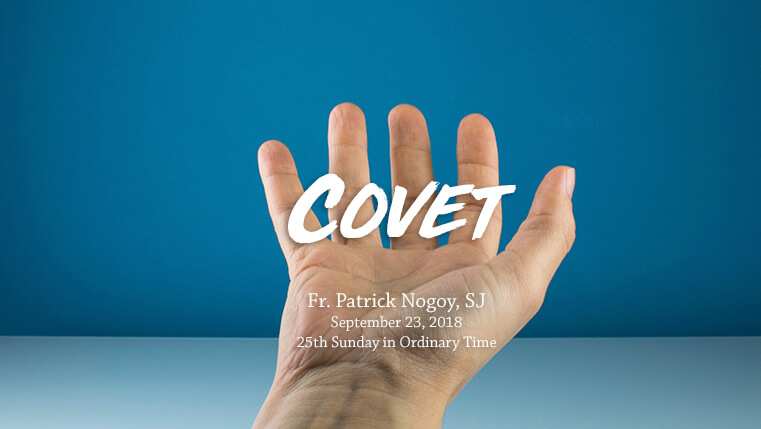


Fr. Patrick Nogoy, SJ
25th Sunday in Ordinary Time
September 23, 2018
Its roots can be traced to the Latin cupiditas which can refer to passionate desire, eagerness, or ambition. What makes it distinctive and more dangerous is the fact that it is a passionate, eager, or ambitious desire of what belongs to another. We can find “covet” repeated twice in the Commandments, emphasizing its destructive force both for the covet-er and the coveted. Lying at the heart of the letter of James in the second reading, the effects of covetousness (e.g. wars, conflicts, murder) and its related synonyms (e.g. jealousy, ambition) are contrasted against wisdom, mercy, and peace. The same comparison is seen in the first reading between the wicked and the just. The wicked despises the correction of the just. They only sink deeper and deeper into living their sinful and illusory “truth”. One can easily draw a reasonable conclusion that covetousness, if left unaddressed, leads to the extremities of stubborn jealousy, corruption, and injustice.
In an intimate journey, Jesus arrests this growing covetousness among his disciples, as displayed in their serious argument about who among them is the greatest. Jesus settles the dispute through a teaching moment: be the servant of all. If the direction of covetousness is to possess what rightfully belongs to another, Jesus reminds his disciples that to be the greatest is to serve the other. It is to dis-possess oneself through other-orientedness: to look at the face of the other with reverent service and not aimed at his or her possessions. Jesus goes even further. He places a child in their midst and mentions the word “receive” four times. A child that is vulnerable for possession (e.g. profit, abuse, manipulation) is asked to be received in His name. Receive.
In more important matters of life, it is receiving rather than possessing that leads to total fulfilment. Receiving can be seen as the opposite of covetousness. In receiving, we are gifted. There is no need to possess, feel entitled, or worse, covet. Receive the other as gift and not as competition. Receive the vulnerable as persons to be nurtured and protected, and not as “things” to be possessed, abused, or manipulated. Receive others in desirous service and not covet them for personal agenda. Receive.
It is not as easy as it appears. Often, our desires do not rub well with the rough edges of our personalities and attitudes. It is tricky, difficult, and, most of the time, a mess to identify and isolate covetousness in our hearts. It is important to rely on loving correction, discerning prayer, and honest self-acceptance. It is also helpful to remind ourselves that our God is the One who gives and we are His gifted. And to see in (and learn from) Jesus as the God who receives perfectly. The art of receiving can be a tiring life-long endeavour yet there is joy in every receipt. There are, as the letter of James reminds us, “fruits of righteousness”. One of them is the simple joy of peaceful sleep and conscience—counting gratefully what we have received and with firm knowledge that we resisted a passionate desire for that which rightfully belongs to others.
What have you received lately? What did you find yourself coveting recently? May the God of gifts heal us of our “covetousness” and sustain us in our maturity in the art of receiving.